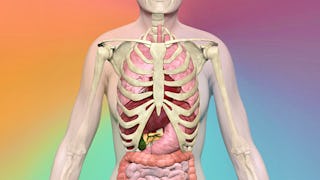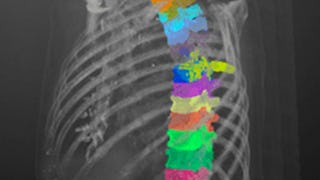Filter by
SubjectRequired
LanguageRequired
The language used throughout the course, in both instruction and assessments.
Learning ProductRequired
LevelRequired
DurationRequired
SkillsRequired
SubtitlesRequired
EducatorRequired
Find the best Biomedical Engineering course for your goals
 Status: Preview
Status: PreviewJohns Hopkins University
Skills you'll gain: Health Systems, Systems Engineering, Medical Devices, Health Technology, Healthcare Industry Knowledge, Systems Integration, Systems Analysis, System Requirements, System Testing, Concept Of Operations, Solution Design
 Status: Free Trial
Status: Free TrialSkills you'll gain: Prompt Engineering, Prompt Patterns, ChatGPT, Generative AI
 Status: Preview
Status: PreviewUniversity of Glasgow
Skills you'll gain: 3D Modeling, 3D Assets, Scientific Visualization, Biomedical Engineering, Medical Terminology, Augmented and Virtual Reality (AR/VR), Anatomy, Animations, Image Analysis, Physiology, Biology, Medical Imaging
 Status: Preview
Status: PreviewMathWorks
Skills you'll gain: Medical Imaging, Magnetic Resonance Imaging, Image Analysis, X-Ray Computed Tomography, Data Import/Export, Biomedical Engineering, Matlab, Computer Vision, Deep Learning, Software Visualization, Machine Learning
 Status: Preview
Status: PreviewYale University
Skills you'll gain: Clinical Trials, Software Development Life Cycle, Medical Devices, Usability, Software Development, Medical Privacy, Human Computer Interaction, Regulatory Affairs, Verification And Validation, Regulatory Requirements, Quality Management Systems, Biomedical Engineering, Risk Management, Software Design, Health Technology, Software Testing, Entrepreneurship, Artificial Intelligence and Machine Learning (AI/ML), User Research, Probability & Statistics
 Status: Preview
Status: PreviewDuke University
Skills you'll gain: Physiology, Respiration, Endocrinology, Anatomy, Pulmonology, Cardiology, Nephrology, Urology, Kinesiology, Vital Signs, Neurology, Biology, Nutrition and Diet
What brings you to Coursera today?
 Status: Preview
Status: PreviewUniversity of Manchester
Skills you'll gain: Biotechnology, Sustainable Technologies, Process Engineering, Molecular Biology, Chemical Engineering, Sustainable Engineering, Life Sciences, Biochemistry, Pharmaceuticals, Biomedical Engineering, Materials science, Scalability
 Status: Free Trial
Status: Free TrialVanderbilt University
Skills you'll gain: Prompt Engineering, ChatGPT, Prompt Patterns, LLM Application, Productivity, OpenAI, Generative AI, Artificial Intelligence, Large Language Modeling, Artificial Intelligence and Machine Learning (AI/ML), Creative Thinking, Creative Problem-Solving, Problem Solving
 Status: NewStatus: Free Trial
Status: NewStatus: Free TrialKhalifa University
Skills you'll gain: Environmental Management Systems, Environment Health And Safety, Environmental Monitoring, Accident Reporting, Safety Training, Occupational Safety and Health Administration (OSHA), Fire And Life Safety, Accident Prevention, Hazardous Waste Operations And Emergency Response Standard (HAZWOPER), Environmental Regulations, Environmental Engineering, Environmental Laws, Environmental Resource Management, Risk Management, Risk Management Framework, Environmental Engineering and Restoration, Risk Analysis, Environment and Resource Management, Engineering Management, Engineering
 Status: Free Trial
Status: Free TrialThe Hong Kong University of Science and Technology
Skills you'll gain: Differential Equations, Linear Algebra, Matlab, Engineering Calculations, Engineering Analysis, Numerical Analysis, Finite Element Methods, Integral Calculus, Mathematical Software, Mechanical Engineering, Calculus, Algebra, Applied Mathematics, Mathematical Modeling, Engineering, Simulation and Simulation Software, Advanced Mathematics, Geometry, Computational Thinking, Estimation
 Status: Free Trial
Status: Free TrialUniversity of Colorado Boulder
Skills you'll gain: Electrical Engineering, Equipment Design, Performance Tuning, Image Quality, Display Devices, Engineering Calculations, Hardware Design, Engineering Analysis, Engineering, Scientific, and Technical Instruments, Computer-Aided Design, Image Analysis, Engineering Design Process, Numerical Analysis, Simulation and Simulation Software, Design Software, Systems Design, Mathematical Modeling, Human Factors, Medical Imaging, Technical Design
 Status: NewStatus: Free Trial
Status: NewStatus: Free TrialDassault Systèmes
Skills you'll gain: Mechanical Design, Computer-Aided Design, 3D Modeling, Assembly Drawing, Engineering Drawings, Mechanical Engineering, Product Engineering, Technical Drawing, Engineering Design Process, Product Development, Manufacturing and Production
Biomedical Engineering learners also search
In summary, here are 10 of our most popular biomedical engineering courses
- Foundations of Healthcare Systems Engineering: Johns Hopkins University
- Generative AI: Prompt Engineering Basics: IBM
- Biomedical Visualisation: University of Glasgow
- Medical Image Processing: MathWorks
- Introduction to Medical Software: Yale University
- Introductory Human Physiology: Duke University
- Industrial Biotechnology: University of Manchester
- Prompt Engineering for ChatGPT: Vanderbilt University
- Health, Safety, and Environmental (HSE) Engineering: Khalifa University
- Mathematics for Engineers: The Hong Kong University of Science and Technology










